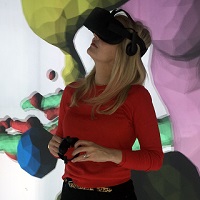Kimberly Arcand - 2020 SPIE Women in Optics Planner
Visualization and Emerging Tech Lead
Chandra X-ray Observatory
NASA, USA
 |
Country of Birth: USA
|
I always loved science as a kid. I lived in an area of New England that had some beautiful night skies. I remember one summer night when I was young, I looked up, and there were points of light streaking across the sky every couple of seconds. It was magical. It was just a meteor shower, probably the Perseids, but it was fantastic.
I use data to tell stories about the Universe, whether in the form of a 3D print of an exploded star, a 2D image of a stellar nursery, or a virtual reality application in high-energy astrophysics. I am an expert in studying the perception and comprehension of high-energy data visualization across the novice-expert spectrum, and a co-founder and principal researcher for the Aesthetics and Astronomy image response research project with international participation.
One major challenge for me was juggling work and life after having kids. My director, ever supportive, convinced me not to quit after I gave birth, and I’m grateful she helped me work through my schedule in those early years. There is not so much a work-life balance for me as a work-life bleed. I don’t compartmentalize well and that’s something I am still working on—being more in the moment at home, and learning to say no more often at work.
It’s ok to struggle and it’s ok to ask for help. The latter was particularly challenging for me in college. I had many responsibilities and I could not keep all the plates spinning in the air. I remember failing one of my classes. I felt like a fraud, like I didn’t belong, like I would never be a good scientist. But I persevered and found good mentors on my campus— professors in different fields than my own: linguistics, computer science, and parasitology. And it made a world of difference in my perspective and in my work. I stopped worrying about being perfect; I stopped fearing failure quite so much; I stopped trying to do it all on my own. It’s still not easy for me to be vulnerable like that. But eventually, I found my way.
Coding is a great skill to learn for STEM. I started tinkering with computers when I was young. I learned how to code. C++ was my first language and it gave me a solid starting point. One of my best academic decisions was to take that first coding class. It opened up so many doors. In astronomy maybe 95% of astronomers need to code at some level for their data, but perhaps 5% of astronomers have had professional instruction in coding. Learning how to code can be instrumental for a science career these days.